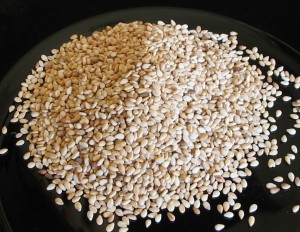How To Benefit From Nutritious Sesame Seeds
Diana Herrington May 25, 2014
“Open Sesame!” were the words spoken by Ali Baba in the Arabian Nights to open the door to the robbers’ treasure.
Open Sesame, describes how the sesame seed pod bursts open when it reaches maturity.
Sesame is known in Africa as “benne” or good luck.
From what we learned in the 20 Huge Health Benefits of Sesame, we can have lots of good luck in our body by eating them.
Sesame seeds are not just luck, they’re an amazing source of health benefits. Sesame seeds are packed with nutrition.
We have been told we must drink milk for healthy bones, but sesame provides calcium and other benefits without the dairy problems.
Sesame Nutrition:
1. One quarter cup of sesame seeds provides more calcium than a whole cup of milk.
Sesame seeds are little powerhouses of protein.
4. Sesame seeds contain all the essential amino acids and help achieve a complete protein.
Sesame has been used throughout history in many forms.
Sesame Seed Trivia:
Sesame Seeds are gluten-free. They don’t contain gluten, making them a perfect food for celiacs and those who simply want to eat gluten-free.
“Open Sesame!” were the words spoken by Ali Baba in the Arabian Nights to open the door to the robbers’ treasure.
Open Sesame, describes how the sesame seed pod bursts open when it reaches maturity.
Sesame is known in Africa as “benne” or good luck.
From what we learned in the 20 Huge Health Benefits of Sesame, we can have lots of good luck in our body by eating them.
Sesame seeds are not just luck, they’re an amazing source of health benefits. Sesame seeds are packed with nutrition.
We have been told we must drink milk for healthy bones, but sesame provides calcium and other benefits without the dairy problems.
Sesame Nutrition:
1. One quarter cup of sesame seeds provides more calcium than a whole cup of milk.
- 1/4 cup of raw sesame seeds = 351 mg of calcium.
- 1 cup of whole milk = 291 mg of calcium.
- Milk is acid forming and sesame seeds are alkaline.
- Calcium is so good for the bones, and can help with migraines and PMS is helped too.
- Lingnans can lower cholesterol and help prevent high blood pressure.
- Sesamol protects against DNA damage caused by radiation.
- Also, sesamin has been found to protect the liver from oxidative damage.
- Plant sterols have been shown to lower blood cholesterol
- Also, plant sterols improve heart health.
Sesame seeds are little powerhouses of protein.
4. Sesame seeds contain all the essential amino acids and help achieve a complete protein.
- They have a higher protein source than most nuts.
- 100 g of sesame seeds = 18 g of protein (32 percent of daily-recommended values).
- Copper is a powerful antioxidant that helps the immune system.
- Copper as an anti-inflammatory and can reduce the swelling of rheumatoid arthritis.
- Also, copper is used by enzymes that build connective tissue, metabolizing iron and synthesizing neurotransmitters.
- Manganese is important for the bones.
- Manganese is also an essential nutrient for many enzyme systems in the body.
- This mineral is needed for bone density. A study found a correlation between low dietary intake of zinc and osteoporosis.
- B-complex vitamins help to improve the nervous system, organs, muscles, skin and hair.
- Minerals are needed for red blood cell production, bone mineralization, enzyme synthesis and hormone production.
- Oleic acid helps lower bad cholesterol and increases good cholesterol in the blood.
Sesame has been used throughout history in many forms.
Sesame Seed Trivia:
- Did you know that India ink comes from the black residue from using sesame oil in lamps?
- Fragrant flowers were dipped in sesame oil and then used for bathing and hair dressing.
- A thousand years ago, the Assyrians, believed that their gods drank sesame wine before creating the earth.
- To prolong youth, women in ancient Babylon would eat halva made up of honey and roasted sesame seeds.
- In India, sesame seeds are used in sacred rituals, they are a symbol of immortality.
- Myanmar, also known as Burma, has the greatest world production of sesame. In 2010, it produced millions of tons of sesame seeds, 18.84 percent of world production.
- Sesame contains unsaturated fats, so it is best to store it in a cool dark place in an airtight container, to avoid them turning rancid.
- Properly stored dry seeds generally stay fresh for several months.
- Always store hulled white seeds in the refrigerator. White sesame seeds have had the hulls removed; they contain 2 to 3 percent oxalic acid, which can interfere with the absorption of calcium and give a bitter flavor.
Sesame Seeds are gluten-free. They don’t contain gluten, making them a perfect food for celiacs and those who simply want to eat gluten-free.
- The easiest way to get sesame nutrition into your diet is to use tahini. I love my Tahini Cream Sauce on vegetables or grains like quinoa which can be made savory or sweet.
- When making homemade breads and muffins, you can sprinkle sesame seeds on top before baking.
- Another easy and tasty way to make a seasoning is to sprinkle sesame seeds called Gomashio onto your foods. Here is my recipe: Gomashio Seasoning
source: www.care2.com



Comments
Post a Comment